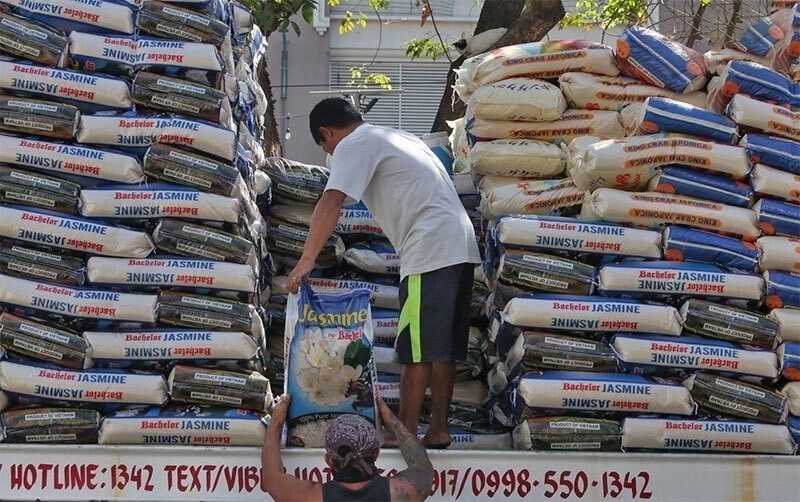DA: Lower tariffs to slash rice prices by P5

MANILA, Philippines — Rice prices could go down by as much as P5 per kilo if tariffs on rice imports would be further reduced, according to government estimates.
Reducing the rice tariffs below 35 percent would result in retail prices of the staple decreasing by P4 to P5 per kilo, Agriculture Assistant Secretary and spokesman Arnel de Mesa said.
Finance Undersecretary Domini Velasquez said the government is looking at further reducing rice tariffs to around 15 to 20 percent compared to the already lowered present rate of 35 percent.
“If we are going to lower the tariffs to 17.5 percent, there would be a huge reduction (in retail prices of rice). Our estimate is about P4 to P5 (per kilo) reduction,” De Mesa said at a forum yesterday.
De Mesa was referring to the tariff rate earlier floated by Finance Secretary Ralph Recto. Earlier this week, Recto disclosed that the government wants to cut rice tariffs further to pull down retail prices of the staple faster.
The government already extended the lower tariff rates of 35 percent on rice imports until the end of the year as part of its counter-inflation measures.
The Department of Finance is willing to forego the estimated revenue losses of “less than P10 billion” arising from the rice tariff reduction in exchange for slowing down the country’s inflation, Velasquez pointed out.
“(The foregone revenues) would not matter much if we are able to bring down the prices (of rice by) P4 to P5,” she said.
De Mesa, meanwhile, said prevailing farmgate prices of palay would not be impacted much by the tariff reduction because of the higher buying price being offered by the National Food Authority (NFA).
Rice imports account for about 20 percent of the country’s total staple supply.
Rice inflation softened to 23.9 percent inflation in April from 24.4 percent in March, based on PSA data.
‘Ill-timed’
Raul Montemayor of the Federation of Free Farmers said reducing rice tariffs further could be “ill timed” since the rice competitiveness enhancement fund (RCEF), which depends on tariff collections, is being amended and improved.
Lawmakers and officials are keen on raising the guaranteed earmark budget of RCEF to P15 billion from the present P10 billion since annual tariff collections have been more than P20 billion in recent years.
All rice tariffs collected are used by the government to bankroll various programs aimed at making local rice farmers more competitive since the RTL law was passed in 2019.
“Let the private sector service the non-poor consumers at market prices. No need to touch tariffs. If we reduce tariffs, we lose revenues and funds for farmers, depress palay prices with no guarantee that retail prices will go down,” he said.
Palay procurement up
Palay procurement has tripled, totaling to 2.8 million bags equivalent 126,000 metric tons of rice, but still short of the NFA target of nine-day consumption of 300,000 MT, NFA Administrator Larry Lacson said.
The NFA has started buying palay for as high as P30 per kilo in the latter part of April 2024 after the NFA council has approved higher procurement in a bid to boost the government’s rice buffer stock.
The dry and clean palay ranged between P23 and P30 per kilo, depending on the prevailing market price in a given province.
Previously, the NFA bought dry and clean palay for P19 to P23 per kilo.
For wet and fresh palay, the NFA’s buying price ranged from P17 to P23 per kilo from the previous P16 to P19 price level.
Meanwhile, Lacson said the NFA is ready to supply rice to concerned government agencies and local government units amid the threat of the La Niña in the country.
According to Lacson, the bulk of the rice stocks is in the hands of the private sector and the household.
RTL amendment
Sen. Cynthia Villar said the Senate will pass the amendments to the Rice Tariffication Law (RTL) or Republic Act 11203 in August after the House of Representatives approved a similar measure on third and final reading.
In a chance interview in Las Piñas City, Villar, who chairs the Senate committee on agriculture and food, maintained that she is against the version of the lower chamber which aims to bring back the power of the NFA to import as well as sell the staple in the market.
“The Department of Agriculture will be given the power (to import rice). They can import free of tariff which can be used to help the poor and the victims of calamities,” Villar said.
Rep. Mark Enverga, chairman of the House committee on agriculture and food security, earlier assured the senators and the public that they definitely have “safeguards” in restoring the power of the NFA in helping stabilize the price of rice.
Meanwhile, Villar said the proceeds from the RTL will be based on the percentage collection instead of the present fixed amount.
She said under the amendments of the RTL, the allocation from the tariff collections to the farmers will be based on percentage of the collection.
According to Villar, aside from the budget allocation for mechanization, inbred seed production, loan for farmers and training, funding for water impounding facilities with solar power, composting machine and emergency fund for rice importation will be added.
Agricultural smugglers
The Agricultural Sector Alliance of the Philippines lauded the passage of the Anti-Agricultural Economic Sabotage Act imposing severe penalties, including life imprisonment on smugglers, hoarders, profiteers and cartels of agricultural and fishery products.
AGAP party-list Rep. Nicanor Briones said the measure aims to protect farmers’ livelihood as well as the state from the manipulative scheme of economic saboteurs.
The measure imposes a penalty of life imprisonment, three times the recommended fine and will be non-bailable.
A private citizen can also file a case.
Under the bill, a tipster or whistle blower will receive at least P1 million to P20 million or 20 percent as reward.
Briones said the measure protects the agricultural producers and welfare of consumers and the economy as a whole and plugs leakages in tax and duty collection.
He said President Marcos’ order to pursue and hold accountable those involved in the smuggling of agricultural products in the country is meaningless if the Bureau of Customs is still in the council of the new law and no case has been filed against smugglers and economic saboteurs. – Bella Cariaso
- Latest
- Trending






























